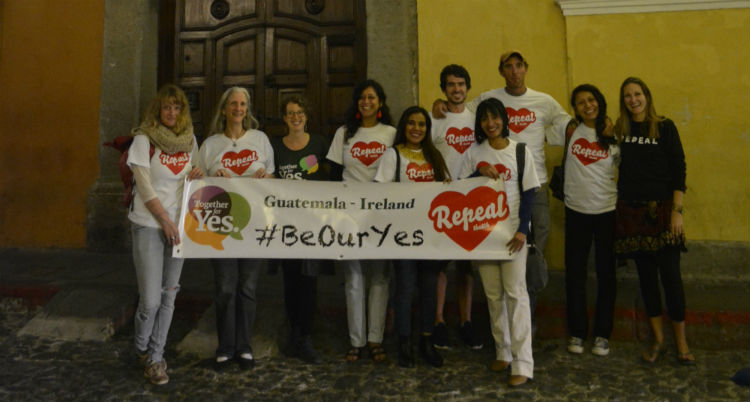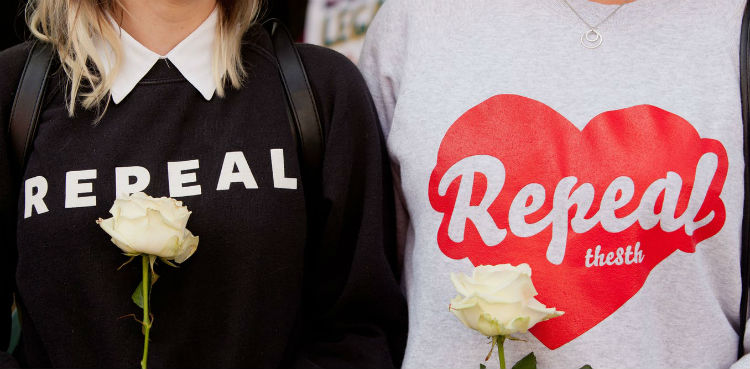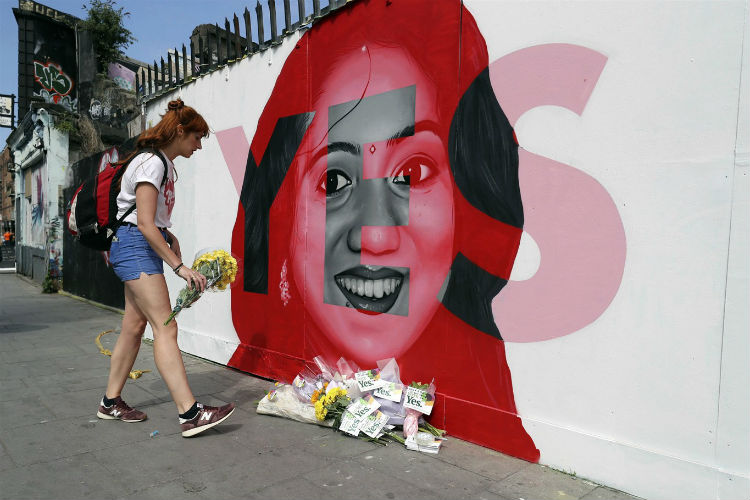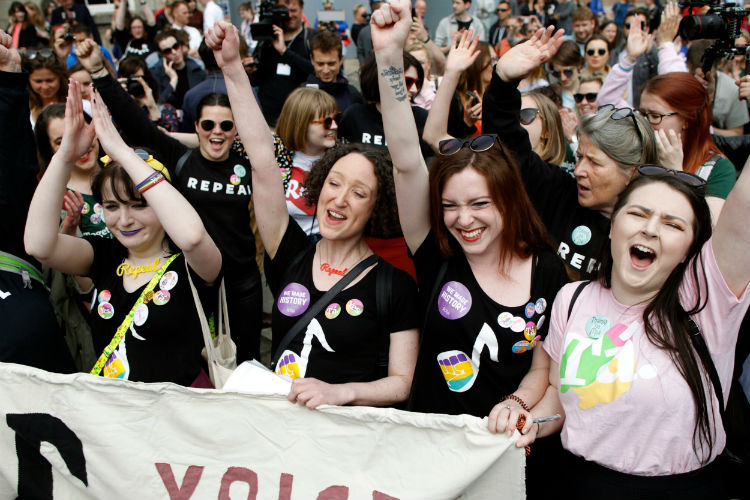REPEAL From Abroad | An Ireland Worth Coming Home To
On Friday the 25th of May I was sitting at my computer eating lunch in Guatemala with knots in my stomach as I followed the twitter alerts: 2 hours to go, 90 minutes, one hour, 15 minutes until polling closed. Then at 3.01 pm Guatemalan time and 10.01 pm Irish time the first exit poll predicted up to 69% in favour of repeal. The tears flowed for hours, for days in fact. Tears of joy, but overwhelmingly of relief. There were also tears of sadness and anger for all it took to get us here and all the women lost along the way.

Would it be enough?
I let out a deep sigh, we did it, I thought, it was enough. In the months, weeks and days running up to the repeal referendum the fear that many people involved in the campaign hardly dared to express was will it all be enough? Will the canvassing, the speaking engagements, social media activity, fundraising, local and global solidarity events, posters, debates, articles, podcasts, interviews, be enough to sway public opinion? Enough to convince people that we have rights, that our lives matter, that we are more than mere vessels for potential life?
People like Tara Flynn, who gave all of herself and more to the campaign, for three long years, were not spared from these doubts. Her experience is captured in the new anthology of her Rage-In columns for HeadStuff. For many of my mother’s generation the memories from the 1983 referendum, when two thirds of the population voted that bodily autonomy must come second to protecting the unborn, were ever present. In 2018 the anti-choice campaign was equally virulent, and went to extremes to maintain the status quo and push their belief that life in the womb must be protected at all costs, never-mind what that cost means in the lives of women and pregnant people. Their graphic posters were everywhere, even outside maternity hospitals, their voices screeched across their airwaves, their words filled column inches of our national dailies. Their misogynistic arguments and the implication that foetuses must be protected from the very people that carry them, often went unchallenged. And despite the fact that the results have revealed they represent a relatively small minority and principally older voters, they were loud enough to make even the most confident of us fear that the 8th would not be repealed.

The weight of the silence that had hung around the issue of abortion in Ireland for so long, the shame and the stigma was hard to shift. The fact that brave women like Tara, Roisin, Arlette, Amanda, Claire and Saoirse put a human face to the issue only to receive constant abuse, weighed on us. The fact that of the thousands of others who shared their stories on In Her Shoes, Repeal Project, Not at Home and Everyday Stories, still felt they could only do so anonymously, weighed on us.
#BeMyYes
Of course this worry was even worse living so far away. I left Ireland only a couple of months after Savita died, a stones throw from my house in Galway. I still managed to make it to a couple of protests but the pro-choice movement was only just getting into gear. I didn’t leave Ireland because of the 8th amendment, but I did leave because the Church led, State sanctioned misogyny at the heart of Irish society was suffocating. Our abortion ban, and everything related to their need to control and police Irish women’s health and sexuality, was part of that.
I had no idea when I left in January 2013 just how much things could change in Ireland. I had no idea I would be missing all the marches for choice and the strikes for repeal. I had no idea how the repeal movement would bring together so many amazing women across generations in the fight of our lives, for our lives. And I had no idea how much not being there to feel the change, to be part of the change, would weigh on me over the last few weeks.

I found myself on the other side of the world, working on human rights, while my Irish sisters were busy organising for our State to recognise our basic right to bodily autonomy. No matter how many articles I wrote, tweets or posts I shared, events organised or money donated, it never felt enough, it was never a substitute for being at home. It was never as brave as the people who have stood for months and years on cold, wet and windy street corners across Ireland sharing information and those who have been knocking on doors for the last few months. Nor was it a substitute for voting. I was fully prepared to come home had it not been for Ireland’s 18 month voting restriction and the fears of legal backlash from any suspicions of electoral fraud. I have never felt so far away and so homesick in my nearly 6 years working abroad. I looked up flights at Christmas, with only one month to go and even two days before hand and still part of me regrets not going, at least to canvass and to stand in Dublin Castle calling out Savita’s name, waiting for the official results to be declared.
I’m not alone. Many other migrants in the run up to the vote and over the last few days have expressed similar frustrations. The women behind Repeal Global and London Irish ARC, did amazing work to bring us together. From Berlin to Beijing and Glasgow to Guatemala, they helped the voices of Irish migrants across more than 20 Repeal Global groups to be heard at home. They helped and encouraged people still entitled to vote to respond to the call for #hometovote. For those of us who were no longer legally entitled to vote we campaigned around #BeMyYes. We wrote to our local newspapers, we had awkward but important Skype chats with family at home. We tweeted, we posted on facebook, we organised solidarity events, doing all we could to send the repeal message home and to stave off the feelings of uselessness.
Many women, like myself, felt that without a repeal of the 8th we would actually reconsider ever moving back to Ireland. And yet I have the repeal movement to thank for making me consider, for the first time since I was 18, that maybe living in Ireland is a possibility for me. On the 26th of May as the results were announced many women across Ireland and abroad felt, for the first time in our lives that Ireland belonged to us and that we belonged to Ireland.
In Awe of Mná
The repeal campaign showed that, in the words of Margaret Mead, we should “Never doubt that a small group of thoughtful, committed citizens can change the world; indeed, it’s the only thing that ever has.” In this case they started off as a very small group of women who decided in 2012 that a change to Ireland’s legal regime was long overdue. By the 24th of may 2018 we had seen hundreds on canvassers mobilised across the country, people queuing around the block for repeal jumpers, Repeal, ARC and Together for Yes groups in every county, groups of artists, midwives, doctors, lawyers, teachers, students, psychiatrists, disabled people, deaf people, the LGBTQI+ communities, parents, grandparents, pregnant people and eventually even men forming groups to advocate for choice and an ever expanding list of celebrity supporters. It seemed like everyone but the mainstream media and politicians had realised that the Ireland today has little in common with the Ireland of 1983 when the 8th was passed by two thirds of the population.

As Claire Daly has said, with notable exceptions, the politicians played catch up and very late in the game, most only when they began to realise the likelihood that repeal would pass and the potential political fallout for themselves and their party if they did not support the campaign. A not insignificant number of TDs, senators and councillors – mostly aging white men, a fitting symbol if the Ireland we are leaving behind – did not come to the same realisation. They still thought that their constituents who mattered were people like my Grandmother who have opposed every move towards progress in Ireland. What they don’t seem to have realised is that people like my Granny are so conservative that even the most backwards back benchers in Fianna Fáil are too liberal for her. Those elected representatives did everything they could to delay and disrupt democratic processes, some of them would have even denied us the 25th of May referendum. Their names and their actions will be remembered by the hundreds and thousands who mobilised in support of choice, when the next elections come round.
Mnáwsome
The women of Ireland put the final, and sharpest, nail in the coffin of the Catholic Church’s once iron grip on our country. So now that our greatest obstacle has been overcome, what should we do with ourselves? In the midst of the repeal campaign we had to endure the Belfast rape trial, the brutal femicide of Jastine Valdez, the heartbreaking cervical check scandal, another scandal around illegal adoptions facilitated by the Catholic Church, the persistence of homelessness in Ireland and the continued existence of direct provision.
Repeal mobilised thousands of women across the country in a way that, in my near 34 years on this planet, I have never seen in Ireland for any other cause. It helped us realise that our voices can and will be heard, that they matter, that we are no longer going to be relegated to the sidelines of our social and political life, that our place is not in the ‘home’ but in the revolution. Also when are we going to get rid of that ridiculous article in the constitution?
Bodily autonomy, as is clear from Kathy Darcy’s anthology, is about much more than safe access to legal abortion – though this is vital – it is also about access to information, about feeling ownership over yourself and your own body, about pleasure, about consent, about enjoying your sexuality, about access to decent health care, about ending slut shaming, body shaming and shame that Irish women, in particular, have carried on their shoulders for generations, ending rape culture, domestic violence, racism, homophobia, lesbophobia, transphobia, justice for the Magdalenes, for the Tuam babies and their mothers and all the other people who have suffered abuse at the hands of the Church and State.

And in the midst of all this struggle we must make some time for for reflection, but particularly for healing. Our bodies are marked with the scars of generations of sexual oppression, a denial of rights and a lack of bodily autonomy. Those scares are not erased by marking X on a ballot paper. That is only one step towards justice. The next will be prompt legislation for free, safe and legal abortion so pregnant people in Ireland can finally stop traveling. We need a national conversation around shame, and how it has been used to keep us in our place. We need to talk about and practice positive sexuality. We need to get the Church out of our health care and education. We need individual and collective processes for healing and for constructing this new more caring and compassionate Ireland we have heard so much about over the last few days.
I made a promise to myself on Friday that next year I will come home, at least for a while. When I left Ireland, only months after Savita’s death, it seemed unimaginable that things could change in Ireland. This time last year a referendum on repeal still felt like a distant dream to many, never mind the possibility that there would be legislation providing for unrestricted access to abortion up to 12 weeks. I never imagined that if returning home to Ireland in 2019 I might be returning to a country with free safe and legal access to abortion. I’m sorry I ever doubted Ireland’s capacity for change, I am sorry I ever doubted the power of Irish women, I am sorry I ever doubted the force of the Irish feminist movement. I stand in awe of mná and confident that we can do so much more. We are a force to be reckoned with, the island will tremble before our strength.
As they say in Latin America: Revolución feminista: en las calles, en las casas, en la cama.
(Feminist Revolution: on the streets, in the kitchen and between the sheets)
